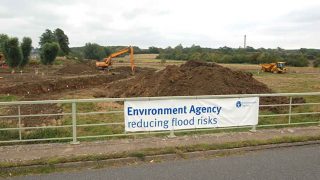Today thousands of Environment Agency (EA) workers in England will stop weekend attendance at incidents such as floods, water pollution, spills, waste fires and fly-tipping.
The industrial action is set to continue for three weeks, with workers refusing to volunteer for ‘on call’ cover between Friday evening and Monday morning.
Where there is a threat to life from incidents such as a major flood, officers will step in as emergency ‘life and limb cover’ has been agreed by the union.
This new wave of industrial action follows a 12-hour walk out in February (pictured), when workers attended pickets outside the Environment Agency’s Marsham Street offices in London.
UNISON members working at the agency have seen pay fall since 2011, meaning that staff effectively work one day a week for free.
Members have been taking last resort industrial action since December 2022, after the organisation failed to offer a fair pay rise in the face of soaring household bills and inflation.
UNISON National Secretary for the Environment Donna Rowe-Merriman said: “UNISON has maintained that pay in the Agency has fallen behind – and for the lowest paid wages will fall below the National Living Wage. This is a disgrace – and action needs to be taken now for all staff to get the pay they deserve.
“We call on the government to enable the Environment Agency to look at innovative ways to resolve the dispute quickly to prevent further disruption – such as the approach that has been agreed with NHS unions.
“Staff are proud to play a vital role in keeping communities safe but feel constantly taken for granted and ignored by a government that has persistently failed to invest in the Environment Agency.
“Wages have been held down for years, prompting many experienced workers to quit for better paid work elsewhere. But as more leave, the pressures increase on those staff left behind. And so, it goes on.
“The blame for any disruption must be laid solely at the Westminster government’s door as the action is a direct result of government pay policy.
“The solution remains a wage rise that’s a better match for inflation and addresses the rising cost of living. Otherwise, staff will continue to resign, leaving even fewer that can be called upon in emergencies. The consequences for people living in areas prone to flooding are unthinkable.”
From April, the lowest pay rate at the EA will fall below the national living wage, forcing the agency to increase rates to meet minimum legal standards.




